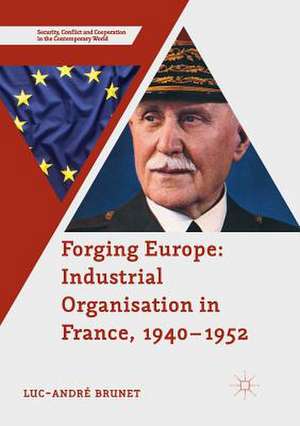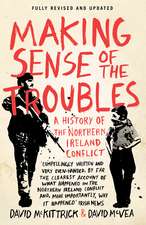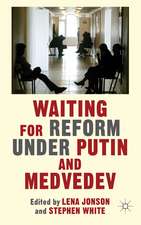Forging Europe: Industrial Organisation in France, 1940–1952: Security, Conflict and Cooperation in the Contemporary World
Autor Luc-André Bruneten Limba Engleză Paperback – 27 iul 2018
| Toate formatele și edițiile | Preț | Express |
|---|---|---|
| Paperback (1) | 638.76 lei 6-8 săpt. | |
| Palgrave Macmillan UK – 27 iul 2018 | 638.76 lei 6-8 săpt. | |
| Hardback (1) | 644.18 lei 6-8 săpt. | |
| Palgrave Macmillan UK – 26 iun 2017 | 644.18 lei 6-8 săpt. |
Din seria Security, Conflict and Cooperation in the Contemporary World
- 9%
 Preț: 765.10 lei
Preț: 765.10 lei - 20%
 Preț: 689.80 lei
Preț: 689.80 lei - 20%
 Preț: 565.89 lei
Preț: 565.89 lei - 20%
 Preț: 629.10 lei
Preț: 629.10 lei - 18%
 Preț: 785.42 lei
Preț: 785.42 lei - 18%
 Preț: 775.15 lei
Preț: 775.15 lei -
 Preț: 386.61 lei
Preț: 386.61 lei - 15%
 Preț: 584.43 lei
Preț: 584.43 lei - 15%
 Preț: 693.25 lei
Preț: 693.25 lei - 15%
 Preț: 527.97 lei
Preț: 527.97 lei - 15%
 Preț: 638.25 lei
Preț: 638.25 lei -
 Preț: 384.86 lei
Preț: 384.86 lei -
 Preț: 481.43 lei
Preț: 481.43 lei -
 Preț: 384.09 lei
Preț: 384.09 lei -
 Preț: 383.12 lei
Preț: 383.12 lei -
 Preț: 391.61 lei
Preț: 391.61 lei - 18%
 Preț: 778.45 lei
Preț: 778.45 lei - 15%
 Preț: 639.37 lei
Preț: 639.37 lei -
 Preț: 390.63 lei
Preț: 390.63 lei -
 Preț: 385.84 lei
Preț: 385.84 lei - 15%
 Preț: 471.69 lei
Preț: 471.69 lei - 15%
 Preț: 586.55 lei
Preț: 586.55 lei -
 Preț: 385.25 lei
Preț: 385.25 lei -
 Preț: 383.33 lei
Preț: 383.33 lei - 18%
 Preț: 731.10 lei
Preț: 731.10 lei - 18%
 Preț: 891.80 lei
Preț: 891.80 lei - 15%
 Preț: 699.77 lei
Preț: 699.77 lei - 15%
 Preț: 703.20 lei
Preț: 703.20 lei - 15%
 Preț: 588.18 lei
Preț: 588.18 lei -
 Preț: 386.81 lei
Preț: 386.81 lei - 18%
 Preț: 786.36 lei
Preț: 786.36 lei - 15%
 Preț: 638.57 lei
Preț: 638.57 lei -
 Preț: 380.63 lei
Preț: 380.63 lei -
 Preț: 390.63 lei
Preț: 390.63 lei
Preț: 638.76 lei
Preț vechi: 751.47 lei
-15% Nou
Puncte Express: 958
Preț estimativ în valută:
122.24€ • 127.15$ • 100.92£
122.24€ • 127.15$ • 100.92£
Carte tipărită la comandă
Livrare economică 15-29 aprilie
Preluare comenzi: 021 569.72.76
Specificații
ISBN-13: 9781349957583
ISBN-10: 1349957585
Pagini: 296
Ilustrații: XII, 296 p.
Dimensiuni: 148 x 210 mm
Greutate: 0.37 kg
Ediția:Softcover reprint of the original 1st ed. 2017
Editura: Palgrave Macmillan UK
Colecția Palgrave Macmillan
Seria Security, Conflict and Cooperation in the Contemporary World
Locul publicării:London, United Kingdom
ISBN-10: 1349957585
Pagini: 296
Ilustrații: XII, 296 p.
Dimensiuni: 148 x 210 mm
Greutate: 0.37 kg
Ediția:Softcover reprint of the original 1st ed. 2017
Editura: Palgrave Macmillan UK
Colecția Palgrave Macmillan
Seria Security, Conflict and Cooperation in the Contemporary World
Locul publicării:London, United Kingdom
Cuprins
Chapter 1: Introduction.- Chapter 2: France’s New Industrial Order: Reorganising Industrial Production after the Fall of France.- Chapter 3: ‘Twixt the cup and the lip: Building the New Industrial Order, 1940-1941.- Chapter 4 The Organisation Committees between Collaboration and Resistance, 1941-1944.- Chapter 5: Nous serons les successeurs, sino les héritiers de Vichy: Maintaining the New Industrial Order in Post-Vichy France.- Chapter 6: Conserver la forme en réformant l’esprit: Reforming Vichy’s Industrial Order, 1944-1946.- Chapter 7: From Organisation Committees to Monnet’s Modernisation Commissions.-Chapter 8: L’Unité de l’Europe est à ce prix : The Struggle between CORSID’s Successors and the Creation of the ECSC.- Chapter 9: Conclusions.
Recenzii
“The book has amply demonstrated the central thesis of Vichy’s transitional influence, not out of ideological adherence but sheer necessity. This is a work that is worth reading.” (Michael B. Miller, H-France Review, Vol. 19 (216), October, 2019)
“The author provides nuanced analysis and detailed coverage that will prove of considerable interest to scholars of France’s wartime economic history. … This work provides a valuable insight into the workings of a significant, and long neglected, aspect of France’s wartime past.” (Thomas Beaumont, French History, Vol. 33 (2), 2019)
Notă biografică
Luc-André Brunet is Lecturer in Twentieth-Century European History at the Open University, UK. Previously he was a Max Weber Fellow at the European University Institute and Pinto Postdoctoral Fellow at the London School of Economics, where he earned his PhD.
Textul de pe ultima copertă
This book is a detailed and original look at the radical reorganisation of French heavy industry in the turbulent period between the establishment of the Vichy regime in 1940 and the creation of the European Coal and Steel Community (ECSC), the forerunner to the European Union, in 1952. By studying institutions ranging from Vichy’s Organisation Committees to Jean Monnet’s Commissariat Général du Plan (CGP), Luc-André Brunet challenges existing narratives and reveals significant continuities from Vichy to post-war initiatives such as the Monnet Plan and the ECSC. Based on extensive multi-archival research, this book sheds important new light on economic collaboration and resistance in Vichy, the post-war revival of the French economy, and the origins of European integration.
Caracteristici
Re-evaluates the origins of European integration by tracing the history of institutions and individuals from 1940 Links the historiographies on European integration and on the Cold War Builds upon and expands our understanding on Vichy France by drawing on previously unused archival documents


















